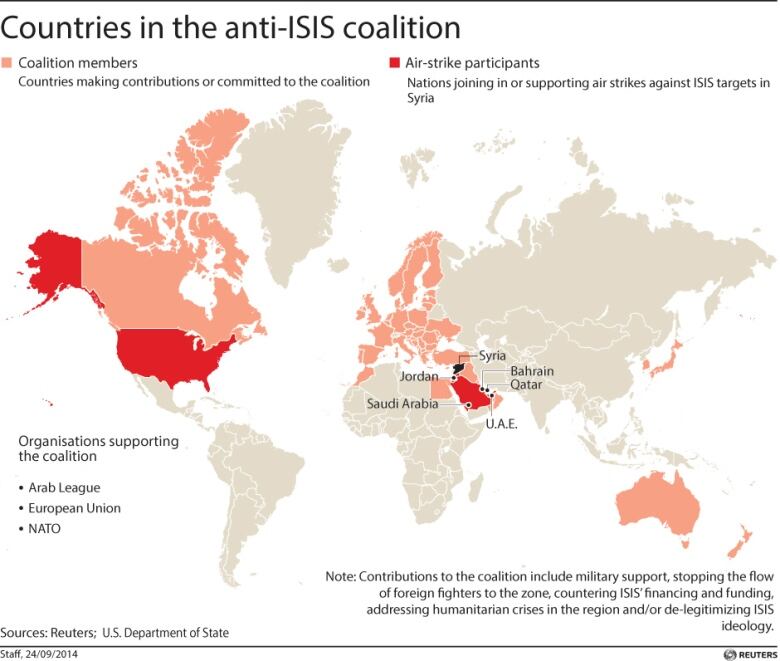How ISIS uses captured oilfields to finance its campaign
'They're relying on very small transactions, and a lot of them,' to finance their operations

To finance its militant campaignin Iraq and Syria, ISIS has reliedheavily on the revenue it generates from captured oilfields, some of which are now being targeted by U.S.-led airstrikes.
- U.S. airstrikes hit ISIS oil sites for second day in a row
- British prime minister urgesU.K. Parliament to join airstrike campaign in Iraq
ISIS oil production has been estimated at tens of thousands of barrels a day, and generates between $1 million and $3 million a day of revenue, analysts say. But thechallenge for the militant group, which is said to control at least11 oilfields, is finding buyers for its product.
"No big traders, noseriouscompaniesare goingto fool around with that oil," saysMatthew M. Reed, vice-president of Foreign Reports, a Washington-based consulting firm that analyzesoil and politics in the Middle East. "That oil is essentially radioactive atthispoint. No one wants totouchit."
What that means is that the vast bulk of ISIS'soil salesis going to so-called "middlemen,"who own their own tanker trucksand who haveconnectionsto established smuggling networks in northern Syria and southern Turkey, or to local refineries in places like Syria, Iraq, Kurdistan and Turkey.
- Members of the anti-ISIS coalition
- The Current: To fight ISIS, the West must consider financial warfare
- ANALYSIS:Why Turkey is reluctant to join U.S-led coalition against ISIS
"They're relyingon very small transactions and a lot of themin orderto move the oilbecausethey'resellingit by tanker truck moreoftenthan not.And a tankertruckcan'thold that much oil," Reed said.
Robin Mills, a Dubai-based energy consultant and the author of two books on the politics of oil,said that these rogue tankers will fill up at the fields and cross the border at smuggling points.
"This is a long, established smuggling trade that's gone on for many years," Mills told CBC's The Current.
Refined oil being used in places fighting ISIS
ISIS is alsorefining some of this oil itself andselling the productin the local market. As well, the group is using some of it to supply its own war effort, Reed said.
"There's goodreasontobelievethatthe refined productcomingfrom ISIS oil isactuallybeingused in placesthatare fighting ISIS," he added.
Andthat includes thesworn enemy of the groups, the regime of SyrianPresidentBasharal-Assad, which is probably getting oileither directly or indirectly from ISIS-controlled fields or territories.
"Theregime in Damascushaspulledits punches with ISIS from the beginning in order to promote the idea that all of Assad'senemies are terrorists," Reed said. "So if you allow ISISto flourish and then ISISin return also gives youbreathingspacelet's say it allows oil to pass through its territory, allowsrefineries theycouldcut offto keep operating under regime control itbenefits both sides."
ISIS is said to control a few smaller fields in northern Iraq but most of its oil comes fromeastern Syria, where it hasundisputed control of most of thatterritory.

However, internationalcompanies that were operating those fieldshave since fled the region, Mills said, and while ISIS has had some success attracting oil engineers, "production is far below what it used to be."
Working on skeleton staff
Most estimates place oil production in the ISIS-controlled parts of Iraq and Syria at around 80,000 barrels a day, but that is a sharpdecline frompre-conflict days.In Iraq for example, those same assets would have produced around 220,000 barrels a day,Luay al-Khatteeb, founder and director of theIraq Energy Institute, told CNN.
"In a lot of these places it sounds like they're working on skeleton staffs ofengineers andotherswho are able to run the refineries," Reed said."Someof thosepeople are just doingit to keep their jobs, others certainlyare under threat. They havebeen told they have to show up."
The oil is also being sold at a steep discount, in some cases as low as $25 a barrel. But that is still apricethatallows ISISto generate up to $3million dollars a day, some analysts say.
Carjackings, bank robberies,extortion, kidnappingsfor ransom are also used to fund its organization. But Reedsaidthere seemsto be a generalagreement that oil is the numberonerevenuestreamfor them.
"It's the only thing they have to sell, really,and youcan only steal so much from thepeople."
He said it's too early to tell what impact the recent U.S.-led airstrike on at least four oil installations and three oilfields controlled by ISISwill have on theiroperations or revenue.
But al-Khatteeb told CNN that the impact of thesestrikes is "going to be immense and grave."
"If they are hitting the facilities and the oil convoys on the smuggling roads they will significantly disrupt supply and regular production. If the bombardments continue it will impact the energy supply and deny ISIS much-needed fuel for their mobility and the servicing of the communities under their rule."
With files from The Associated Press












_(720p).jpg)


 OFFICIAL HD MUSIC VIDEO.jpg)
.jpg)



























































































